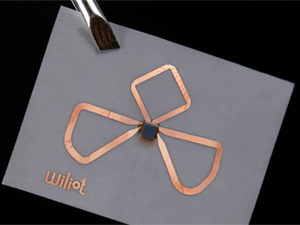



Date:16/01/19
 On Monday, Israel-based semiconductor company Wiliot demonstrated a first-of-its-kind Bluetooth chip at the National Retail Federation’s (NRF) annual retail expo.
On Monday, Israel-based semiconductor company Wiliot demonstrated a first-of-its-kind Bluetooth chip at the National Retail Federation’s (NRF) annual retail expo.
The chip is paper-thin and about the size of a postage stamp. It can sense weight and temperature and is able to send encrypted information via Bluetooth a distance of about 3 meters. Rather than using some sort of battery to power this operation, the chip pulls energy from ambient Wi-Fi, Bluetooth, and cellular signals.
Following the NRF demonstration, Wiliot announced that it had raised an additional $30 million in funding, with tech powerhouses Amazon and Samsung both investing.
Wiliot is confident that its battery-free Bluetooth chips will help us realize the promise of a fully connected world.
“Re-cycling the radiation around us to power sticker-size sensors can enable new ways for consumers to interact with products that were previously not feasible,” Wiliot CEO and co-founder Tal Tamir said in a press release. “Products can share when they are picked up, their temperature, or when they need to be replenished.”
“Without batteries or other high-cost components,” he continued, “tags have unlimited power and lifespan, so they can be embedded inside of products that were previously unconnected to the Internet of Things.”
World’s First Battery-Free Bluetooth Chip Pulls Power from the Air
 On Monday, Israel-based semiconductor company Wiliot demonstrated a first-of-its-kind Bluetooth chip at the National Retail Federation’s (NRF) annual retail expo.
On Monday, Israel-based semiconductor company Wiliot demonstrated a first-of-its-kind Bluetooth chip at the National Retail Federation’s (NRF) annual retail expo.The chip is paper-thin and about the size of a postage stamp. It can sense weight and temperature and is able to send encrypted information via Bluetooth a distance of about 3 meters. Rather than using some sort of battery to power this operation, the chip pulls energy from ambient Wi-Fi, Bluetooth, and cellular signals.
Following the NRF demonstration, Wiliot announced that it had raised an additional $30 million in funding, with tech powerhouses Amazon and Samsung both investing.
Wiliot is confident that its battery-free Bluetooth chips will help us realize the promise of a fully connected world.
“Re-cycling the radiation around us to power sticker-size sensors can enable new ways for consumers to interact with products that were previously not feasible,” Wiliot CEO and co-founder Tal Tamir said in a press release. “Products can share when they are picked up, their temperature, or when they need to be replenished.”
“Without batteries or other high-cost components,” he continued, “tags have unlimited power and lifespan, so they can be embedded inside of products that were previously unconnected to the Internet of Things.”
Views: 491
©ictnews.az. All rights reserved.Similar news
- The mobile sector continues its lead
- Facebook counted 600 million active users
- Cell phone testing laboratory is planned to be built in Azerbaijan
- Tablets and riders outfitted quickly with 3G/4G modems
- The number of digital TV channels will double to 24 units
- Tax proposal in China gets massive online feedback
- Malaysia to implement biometric system at all entry points
- Korea to build Green Technology Centre
- Cisco Poised to Help China Keep an Eye on Its Citizens
- 3G speed in Azerbaijan is higher than in UK
- Government of Canada Announces Investment in Green Innovation for Canada
- Electric cars in Azerbaijan
- Dominican Republic Govt Issues Cashless Benefits
- Spain raises €1.65bn from spectrum auction
- Camden Council boosts mobile security





















